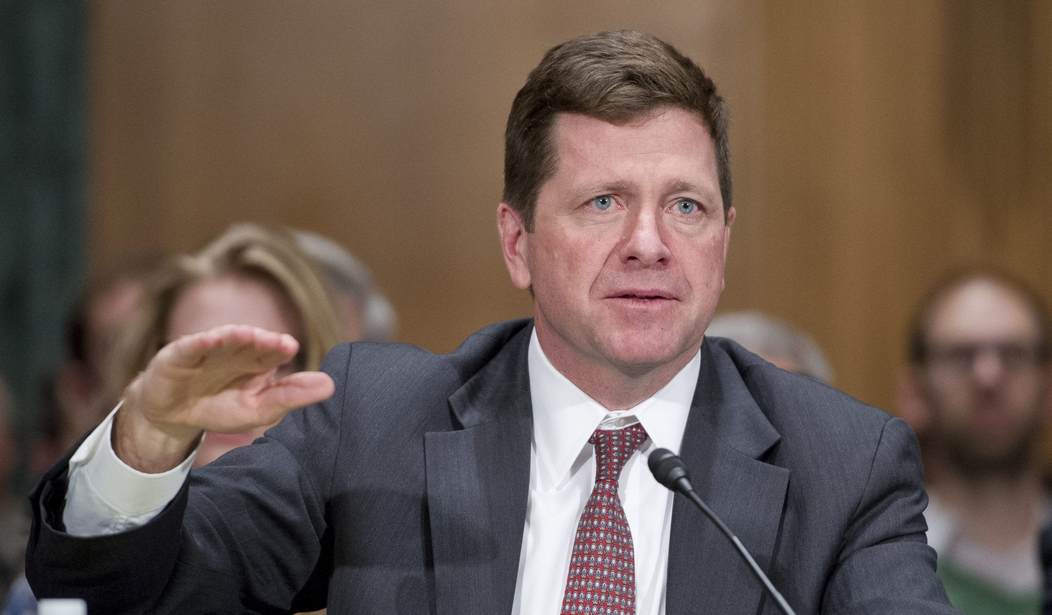WASHINGTON – The Securities and Exchange Commission’s purpose is to enable pursuit of the American Dream, Commissioner Michael Piwowar said Monday.
“It’s no less than helping to facilitate the American Dream,” Piwowar said at the Heritage Foundation. “If you think about it, the dream of entrepreneurs is to take their entrepreneurial spirit, put it into action, start a company, raise capital, hire workers, bring a product or service to market, thereby increasing the standard of living to the customers that buy their product to employees that are employed by them and the investors that share in their success.”
If the individual is more of a consumer than an entrepreneur, he said that the American Dream is about taking hard-earned savings and investing in the entrepreneurial spirit of others. Successful relationships in that area, he said, increase the standard of living for the individual, for their children and the community the individual is investing in.
“For me, our mission is to make sure we’re preserving the American Dream by allowing Americans to invest in the American Dream by investing in each other,” Piwowar continued.
Facilitating that American Dream, the commissioner said, requires getting out of the “Washington, D.C. echo chamber” and listening to the individuals and groups who are affected by the SEC’s rules and regulations. The commissioner, whose term expires in 2018, expressed excitement about working with Chairman Jay Clayton after the previous chairwoman, Mary Jo White, focused on “enforcement first and the Dodd-Frank death march second.”
The Obama administration implemented the Dodd-Frank Wall Street Reform and Consumer Protection Act in the aftermath of the 2008 financial crisis, levying greater restrictions and regulations on the financial sector in an attempt to rein in what President Obama described as an unchecked and irresponsible Wall Street. The House in early June approved the Financial Choice Act, a bill that would reverse course on many key Dodd-Frank reforms, but the legislation faces a tougher battle trying to gain support in the Senate. Republicans have blamed Dodd-Frank for stifling innovation and slowing down the economic recovery.
Piwowar said it’s been “awesome” working with Clayton, who he said was chosen by President Trump to carry out a three-fold mission: protect investors, maintain fair and orderly markets and promote capital formation. The third item, the commissioner said, will be a broad theme under Clayton.
The commissioner also touched on the fate of Title VII under Dodd-Frank, a regulation that addresses over-the-counter derivatives. Under Title VII, regulatory jurisdiction is split between the SEC and the Commodity Futures Trading Commission. The CFTC has finalized a number of rules concerning Title VII, rules that Piwowar said the SEC has not gone as far on.
“At the same time, we need to make sure that we work with the CFTC to make sure that our rules are harmonized. They have jurisdiction over swaps. We have security-based swaps,” he said. “There’s an opportunity for us to work with the CFTC to work on a more collaborative basis in terms of them revisiting our rules and us moving forward with our rules, and so I think you’re going to see more collaboration, more cooperation between the two agencies on those rules going forward.”
He noted that SEC staff is looking through public comments on the rules process, and “we’ll see what we can move forward on.”
Piwowar was asked about his stance on SEC responses to Freedom of Information Act requests. The commission’s general counsel recently advised against disclosing certain pieces of information regarding votes when SEC cases are sent to federal district court. The general counsel reasoned that certain information tied to those votes is privileged information.
Piwowar responded that SEC is an award-winning office in terms of response to FOIA requests, whether it’s on an ad hoc basis or in terms of public communication through the agency’s website.
“I don’t see any reason why we can’t continue to make this information public. I have nothing to hide,” Piwowar said.








Join the conversation as a VIP Member